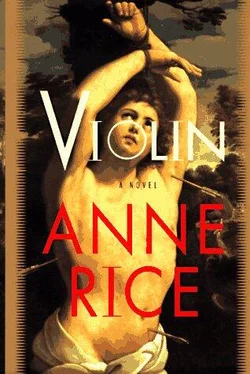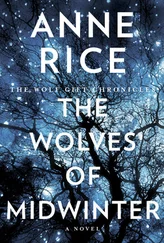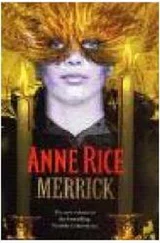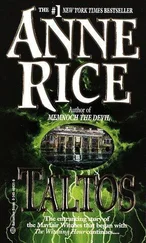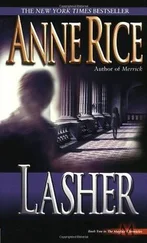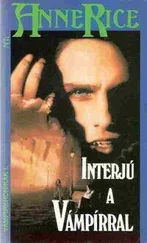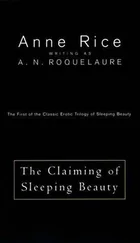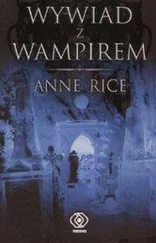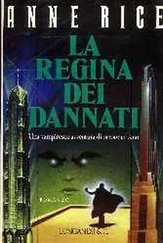I stared back at the wandering young spirit.
Snow fell.
The young spirit watched it and saw that it didn't touch his cloak or his hair but seemed to fly past; he tried to catch it with his hands. He smiled.
His feet made a crunch in the snow. Was this something he truly felt or merely a sensation he supplied himself through will and anticipation? His long cloak was a dark shadow in the drifting snow, the hood thrown back, his eyes blinking into the white soundless flood from Heaven.
Suddenly a ghost startled him-a filmy wanderer out of the forest, a woman in grave wrappings, evidently addicted to menace, but he fought her off. He was shaken.
Though he'd done it with one stroke of his arm, he shivered and he ran. The snow grew thicker, and it seemed for a moment I could not see him at all, and then he appeared, visible, dark, ahead of us.
It was the cemetery again, full of graves both large and small. He stood at the gates. He peered inside. He saw a wandering ghost drifting by, talking to itself like a mad human, a gossamer thing of snaggled hair and wavering limbs.
He reached out and pushed the gate. Was this fancy? Or was he strong enough to make this material thing move? He didn't test it beyond this but merely walked past the high pickets and down the wintry path where snow had not come yet but all the fallen leaves were crisp and red and yellow.
Ahead, a small group of human mourners gathered by a humble grave, its stone no more than a pyramid. They wept, and finally all drifted away but one, one elderly woman, who, walking off, found a place to be seated on the edge of a mo re richly carved monument, beside the graven statue of a dead child! A dead child! I marveled.
The dead child was marble and held a flower in her hand. I saw my daughter-but this was fleeting-there was no monument for my Lily-and this cemetery of another century-descended once more, with our wandering ghost staring at the distant mournful figure-a woman in a black bonnet with long satin strings, a woman in big full skirts, skirts of a later time than when Vera in her slim gown had rushed across a room to save her brother.
Did the ghost realize this? Decades had gone by? The ghost merely gazed on the woman and walked in front of her, testing his invisibility to her, and shook his head in thoughtful meditation. Was he resigned now to the utter horror of purposeless existence?
Suddenly his eyes fell on the grave round which the mourners had gathered! He saw the single name carved on the pyramid.
I saw it too.
Beethoven.
A cry came from young Stefan's lips that should have waked all from their graves! Once again, clutching instrument in one hand and bow in the other, he pressed his fists to his head as he roared and roared. "Maestro! Maestro!"
The mourning woman heard nothing, noticed nothing. She didn't see the ghost who flung himself into the dirt, digging at it with his hands, letting the violin tumble loose.
"Maestro, where are you? Where did you go? When did you die? I'm alone!
Maestro, it's Stefan, help me. Lay my case before God! Maestro."
Agony.
Angor animi.
The Stefan beside me quaked, and the pain in my chest spread like a fire in my heart and lungs. The young man lay before the neglected monument, among the flowers left there by the woman. He sobbed. He beat his fist upon the ground.
"Maestro! Why did I not go to Hell! Is this Hell? Maestro, where are the ghosts of the damned, is this damnation, Maestro, what have I done? Maestro .. ." Now it was grief, pure grief. "Maestro, my beloved teacher, my beloved Beethoven."
His sobs were dry and soundless.
The mourning woman only looked at the stone with the name Beethoven.
Through her fingers passed the beads, very slowly, of a simple black and silver Rosary.
The somber kind of Rosary used by nuns when I was a little girl. I saw her lips moving.
Her face was narrow, eloquent, her eyes half-lidded as she prayed. Gray eyelashes, scantly visible, gaze fixed as though she truly meditated on the sacred Mysteries. Which one did she see before her?
She heard no cries from anyone there; she was alone, the human; and he was alone, the spirit. And the leaves spread out yellow all around them, and the trees thrust weak bare limbs into the hopeless sky.
At last, he drew himself together. He climbed to his knees and then to his feet and he lifted the violin, brushing the dirt and bits of leaf from it. He bent his head in a perfect statement of sorrow.
It seemed an endless time the woman prayed. I could almost hear her prayers.
She said her Hail Marys in German. She had come to the fifty-fourth bead, the last Hail Mary, or Ave, of the last decade. I looked at the marble statue of the child beside her.
Stupid, stupid, coincidence, or his connivance that he had presented this scene thus to me, with that child in marble and a woman in black. And a Rosary, a Rosary such as Rosalind and I had once torn to pieces in a quarrel after our Mother's death, "It's mine!"
Don't be the vain fool. This is what happened! Do you think I pluck it from your mind, the disasters that twisted my soul and made me what I am? I show you who I am, I make up nothing. I have such agony in me that imagination means nothing; it's overwhelmed by a fate that ought to teach you frar and compassion. Give me back my violin.
"Do you learn compassion from this?" I demanded. "You who would drive people mad with your music?"
His lips touched my neck, his hand ground hard into my arm.
The young ghost brushed leaves from his fur-lined cloak, just as a human man might do, and watched in a daze as they fell to the ground. Again, he looked at the name:
Beethoven.
Then he reached down to gather up his violin and his bow, and this time, as he lifted the instrument to play, he began a familiar theme, a theme I knew with my whole heart, the first theme of music I had ever memorized, in my life. It was the lead melody from Beethoven's one and only Concerto for violin and orchestra-that lovely, lovely zesty song that seems too full of happiness really to be the Beethoven of the heroic symphonies and mystical quartets, a song even a talentless boob like me could memorize in one night, as I watched an old genius play it.
Softly, Stefan played it, not telling of grief, but only of tribute. For you, Maestro, the music you wrote, this sprightly melody for the violin written when you were young and before the horror of silence came down on you, and wrapped you away from all the world so that you had to make music that was monstrous in that vacuum.
I could have sung this melody with him. How perfectly it rose from the strings, and how the distant ghost let himself drift into it, body scarcely moving, winding in and out of the melody itself to take up orchestral parts and weave them back into the solo, just as he had done with another piece of music so long ago for Paganini.
At last he came to that part which is called the cadenza, when the violinist is to take two themes or all themes and play them together, when themes collide, intermingled in an orgy of invention, and this he let loose-fresh, and lustrous, and full of sweet serenity. His face was smooth with resignation. He played and he played, and gradually I felt my own body grow limp in my Stefan's arms. I felt myself understand what I had tried to tell him:
Grief is wise. Grief does not cry. Grief comes only long after the horror at the sight of the grave, the horror at the side of the bed, grief is wise, and grief is imperturbable.
Stillness. He had come to the end. The note hovered in the air, then died. Only the forest sang on in its usual muted song, of tiny organic instruments too varied ever to be counted-birds, leaves, the cricket beneath the fern. The air was gray and soft and wet and clinging.
Читать дальше
